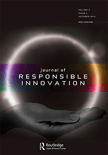
Journal of Responsible Innovation
Scope & Guideline
Driving impactful discourse on responsible innovation.
Introduction
Aims and Scopes
- Responsible Research and Innovation (RRI) Framework:
The journal centers on the RRI framework, advocating for practices that consider ethical, social, and environmental implications of innovation, ensuring that research aligns with societal needs. - Interdisciplinary Collaboration:
It promotes collaboration across disciplines, integrating insights from social sciences, ethics, technology, and policy to foster a holistic understanding of responsible innovation. - Stakeholder Engagement:
The journal emphasizes the importance of engaging diverse stakeholders, including the public, industry, and policymakers, to co-create solutions and enhance the societal relevance of innovations. - Critical Reflection and Evaluation:
A core focus is on critical reflection regarding the processes and outcomes of innovation, encouraging scholars to evaluate the implications of their work in real-world contexts. - Global Perspectives and Inclusivity:
The journal seeks to incorporate global perspectives, particularly from the Global South, to address inequities and promote inclusive innovation practices.
Trending and Emerging
- Decolonization in Research Practices:
Recent publications are increasingly addressing the need to decolonize research practices, particularly in relation to indigenous perspectives and methodologies, emphasizing inclusivity and equity. - Artificial Intelligence and Ethics:
There is a growing focus on the ethical implications of artificial intelligence, exploring issues of trust, accountability, and the dual-use nature of AI technologies, indicating heightened concern over these advancements. - Climate Innovation and Sustainability:
Themes related to climate innovation are gaining traction, highlighting the role of responsible innovation in addressing climate change and promoting sustainable practices across various sectors. - Participatory Design and Co-Creation:
The journal is seeing an increase in studies that emphasize participatory design and co-creation with stakeholders, reflecting a shift towards collaborative approaches in innovation processes. - Reflexivity and Critical Engagement:
Emerging discussions on reflexivity in research and innovation practices are becoming prominent, encouraging scholars to critically engage with their methodologies and the implications of their work.
Declining or Waning
- Traditional Technology Assessments:
There is a noticeable decline in publications solely focused on traditional technology assessments, as the discourse shifts towards more integrated and participatory approaches to evaluating technologies. - Narrowly Defined Ethical Frameworks:
The journal is moving away from narrowly defined ethical frameworks that do not account for the complexity of social contexts, favoring broader, more inclusive discussions of ethics in innovation. - Sector-Specific Innovations:
Themes centered around specific sectors, such as agriculture or health, are becoming less frequent as the focus broadens to encompass cross-sectoral issues and systemic challenges. - Historical Case Studies:
Research that relies heavily on historical case studies without contemporary relevance is waning, as the journal increasingly values studies that address current challenges and future implications. - Technological Determinism:
There is a decline in publications that assume a deterministic view of technology, as the journal encourages more nuanced discussions about the co-production of technology and society.
Similar Journals
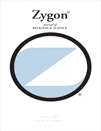
ZYGON
Exploring the Intersections of Culture, Religion, and EducationZYGON, an esteemed journal published by Wiley, has been at the forefront of interdisciplinary research since its inception in 1966. With a strong focus on Cultural Studies, Religious Studies, and Education, ZYGON plays a vital role in fostering dialogue and scholarly discourse across these fields. It is categorized in the Q1 quartile for both Cultural and Religious Studies, underscoring its high impact and relevance in contemporary academic discussions. The journal is indexed with impressive rankings in Scopus, including a rank of #112 out of 644 in Religious Studies, placing it in the 82nd percentile, which reflects its contributions to advancing knowledge and understanding in the humanities and social sciences. ZYGON is committed to cultivating rigorous scholarship without an open access model, ensuring that its rich content remains well-curated for researchers, professionals, and students alike. With plans to continue its publication through 2024, ZYGON remains a critical platform for innovative research and is essential for anyone engaged in the exploration of cultural and religious intersections.

Business Ethics the Environment & Responsibility
Transforming research into actionable insights for a better world.Business Ethics, the Environment & Responsibility is a distinguished academic journal published by Wiley in the United Kingdom, focusing on the intersection of ethical business practices, environmental sustainability, and social responsibility. With an emphasis on multidisciplinary research, the journal serves as a platform for scholars and practitioners who seek to advance knowledge in areas such as business and international management, economics, and organizational behavior. The journal has achieved a notable Q1 ranking in Philosophy and Q2 rankings across various relevant categories, reflecting its significant impact within the academic community, as evidenced by its impressive Scopus rankings, including a top percentile in Philosophy. As an Open Access publication, it provides unrestricted access to vital research, enhancing visibility and accessibility for researchers, professionals, and students alike. As it continues to bridge gaps between theoretical inquiry and practical application, Business Ethics, the Environment & Responsibility plays a crucial role in shaping ethical discourse and promoting responsible business practices in an increasingly complex global landscape.
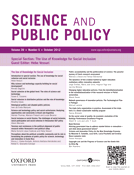
Science and Public Policy
Bridging the Gap Between Science and GovernanceScience and Public Policy, published by Oxford University Press, serves as a vital conduit for research at the intersection of scientific inquiry and public governance. With its ISSN 0302-3427 and E-ISSN 1471-5430, this esteemed journal has steadily built a reputation for excellence within multiple fields, identified in 2023's quartile rankings as Q1 in Geography, Planning and Development, Q2 in Management, Monitoring, Policy and Law, and Q1 in Public Administration. The journal’s scope includes in-depth analysis and discussions on how scientific knowledge influences public policy decisions, essential for researchers, professionals, and students alike. Spanning decades since its inception in 1974, Science and Public Policy is committed to providing a platform for scholarly work that addresses contemporary issues affecting policy frameworks, making it a crucial resource for those invested in the relationship between science and society. With a consistent track record of high impact, evident in its Scopus rankings that place it in the 75th percentile for Geography and Planning, and 70th for Public Administration, the journal promises to be an indispensable part of your library.
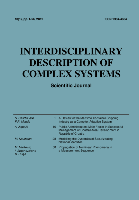
Interdisciplinary Description of Complex Systems
Fostering Innovation in the Study of Complex SystemsInterdisciplinary Description of Complex Systems is a prominent academic journal dedicated to the exploration and understanding of complex systems, published by the CROATIAN INTERDISCIPLINARY SOC. Since its inception in 2003, this journal has embraced an Open Access model, facilitating the widespread dissemination of research within a diverse range of disciplines intersecting with complex systems theory. The journal spans fields including mathematics, engineering, natural and social sciences, making it a vital resource for researchers, professionals, and students eager to explore interconnected systems in a global context. With its rigorous peer-review process and commitment to innovation, Interdisciplinary Description of Complex Systems stands as a significant contributor to advancing knowledge, encouraging interdisciplinary collaboration, and fostering new insights into complex phenomena. The journal’s dedication to open access ensures that valuable research is freely available, promoting global participation in the scholarly dialogue.
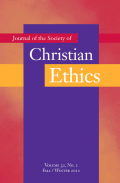
JOURNAL OF THE SOCIETY OF CHRISTIAN ETHICS
Navigating Moral Complexities with Scholarly InsightJOURNAL OF THE SOCIETY OF CHRISTIAN ETHICS, published by the Society of Christian Ethics, is a prominent peer-reviewed journal dedicated to the scholarly exploration of ethical issues within Christian traditions. With a rich history since its inception in 2002, this journal has established itself as a significant resource for researchers and practitioners in the fields of Philosophy and Religious Studies, reflected in its Q3 quartile rankings and respectable Scopus ratings. Based in the United States, and affiliated with St. John's University, the journal seeks to advance dialogue on complex moral dilemmas encountered in contemporary society through the lens of Christian ethics. Although not an Open Access journal, its compelling contributions and insightful articles are invaluable for students, academics, and professionals aiming to deepen their understanding of ethical discourse. As it converges through the years up until 2024, the Journal of the Society of Christian Ethics remains a vital platform for interdisciplinary engagement and ethical scholarship.

Ethics and Information Technology
Bridging Technology and Morality for a Better TomorrowEthics and Information Technology, published by Springer, stands as a pivotal journal in the interdisciplinary field that bridges technology with ethical considerations. With an ISSN of 1388-1957 and an E-ISSN of 1572-8439, this journal serves as a key resource for scholars exploring the complex dynamics between information technology and ethical implications, helping to shape the discourse around privacy, cybersecurity, and digital governance. Ranking in the top quartile of both Computer Science Applications and Library and Information Sciences, the journal has attained impressive Scopus rankings, placing it at #25 out of 280 in Social Sciences and #156 out of 817 in Computer Science. This high standing reflects its significant impact and relevance in contemporary research, as well as its invaluable contribution towards fostering a responsible use of technology. Researchers, professionals, and students can benefit from its comprehensive studies and cutting-edge findings, making it a crucial platform for advancing knowledge in this essential area of study. The journal has been continuously published since 1999, with content converging through to 2024, ensuring that it remains up-to-date with the rapid advancements in technology and ethics.
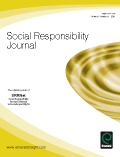
Social Responsibility Journal
Driving Change in Business Through Social ResponsibilitySocial Responsibility Journal, published by Emerald Group Publishing Ltd, stands at the forefront of scholarly discourse in the fields of Business, Management, and Social Sciences. With an impressive impact factor and recognition as a Q1 journal in both disciplines, it consistently ranks among the top publications, currently positioned #28 out of 604 in Social Sciences and #37 out of 218 in Business, Management and Accounting. This journal offers a platform for researchers and professionals to explore the evolving landscape of social responsibility, providing insights that shape equitable business practices and enhance societal impact. As it converges its scope from 2005 to 2024, the journal encourages contributions that address contemporary challenges and advancements in social responsibility, making it an indispensable resource for academics, practitioners, and students dedicated to fostering sustainability in a dynamic world. While currently not an open-access journal, its rigorous peer-review process ensures that high-quality research reaches audiences eager to promote positive change.
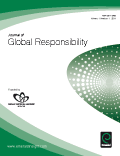
Journal of Global Responsibility
Promoting Equity and Sustainability in ManagementJournal of Global Responsibility, published by Emerald Group Publishing Ltd, is a leading journal in the field of Business and International Management, with an impressive Q2 ranking as of 2023 in the Scopus category. Since its inception in 2010, this journal has become an essential platform for researchers and professionals dedicated to exploring the intersection of global business practices and ethical responsibility, contributing to the body of knowledge aimed at fostering sustainable and equitable management strategies. The journal's address in Leeds, United Kingdom, reflects its commitment to a broad, international perspective. With a Scopus rank of 130 out of 443 and a 70th percentile standing, it offers significant visibility and influence in the academic community. Although currently not open access, the Journal of Global Responsibility provides a critical forum for disseminating innovative research, case studies, and theoretical insights, inviting contributions that address pressing global challenges faced by businesses and fostering dialogue aimed at responsible management practices. Whether you are a researcher, practitioner, or student, engaging with this journal can enhance your understanding of global responsibility in business.
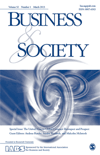
Business & Society
Innovating Solutions for a Sustainable FutureBusiness & Society, an esteemed journal published by SAGE Publications Inc, serves as a leading platform for scholarly discourse at the intersection of business practices and societal impact. With a long-standing legacy since its inception in 1960, the journal has established itself as a premier publication, currently holding a prestigious Q1 ranking in both Business, Management and Accounting (miscellaneous) and Social Sciences (miscellaneous) categories, with remarkable Scopus ranks of #2/189 and #6/604, respectively, placing it well within the 99th percentile. The journal aims to foster a deeper understanding of the complex interactions between business and societal factors, encouraging innovative research that addresses critical contemporary challenges. While it does not provide Open Access options, the journal remains essential reading for researchers, professionals, and students seeking to explore the dynamic landscape of business ethics, corporate social responsibility, and sustainability. For more information, visit its address at 2455 Teller Rd, Thousand Oaks, CA 91320.
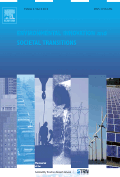
Environmental Innovation and Societal Transitions
Bridging Knowledge and Action for a Greener TomorrowEnvironmental Innovation and Societal Transitions, published by ELSEVIER, stands as a leading academic journal in the fields of Environmental Science, Renewable Energy, and Social Sciences. With an impressive impact factor and ranking in the 98th percentile in Social Sciences and 96th percentile in Environmental Science, this journal is recognized for its rigorous peer-reviewed articles that contribute significantly to the discourse on sustainability and technological advancements. Established in 2011, it embodies the dynamic interplay between environmental innovation and societal adaptation, making it crucial for researchers, professionals, and students dedicated to understanding and shaping sustainable futures. The journal's commitment to high-quality research is evidenced by its placement in the Q1 category across multiple disciplines, asserting its pivotal role in advancing knowledge and practical solutions in these critical areas of study.